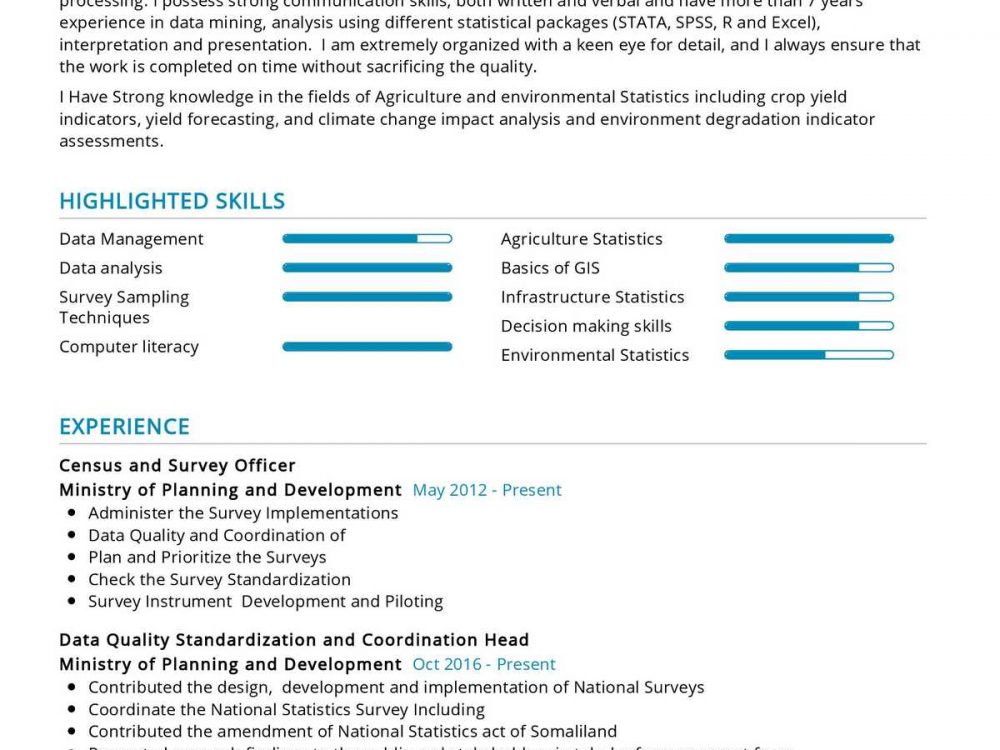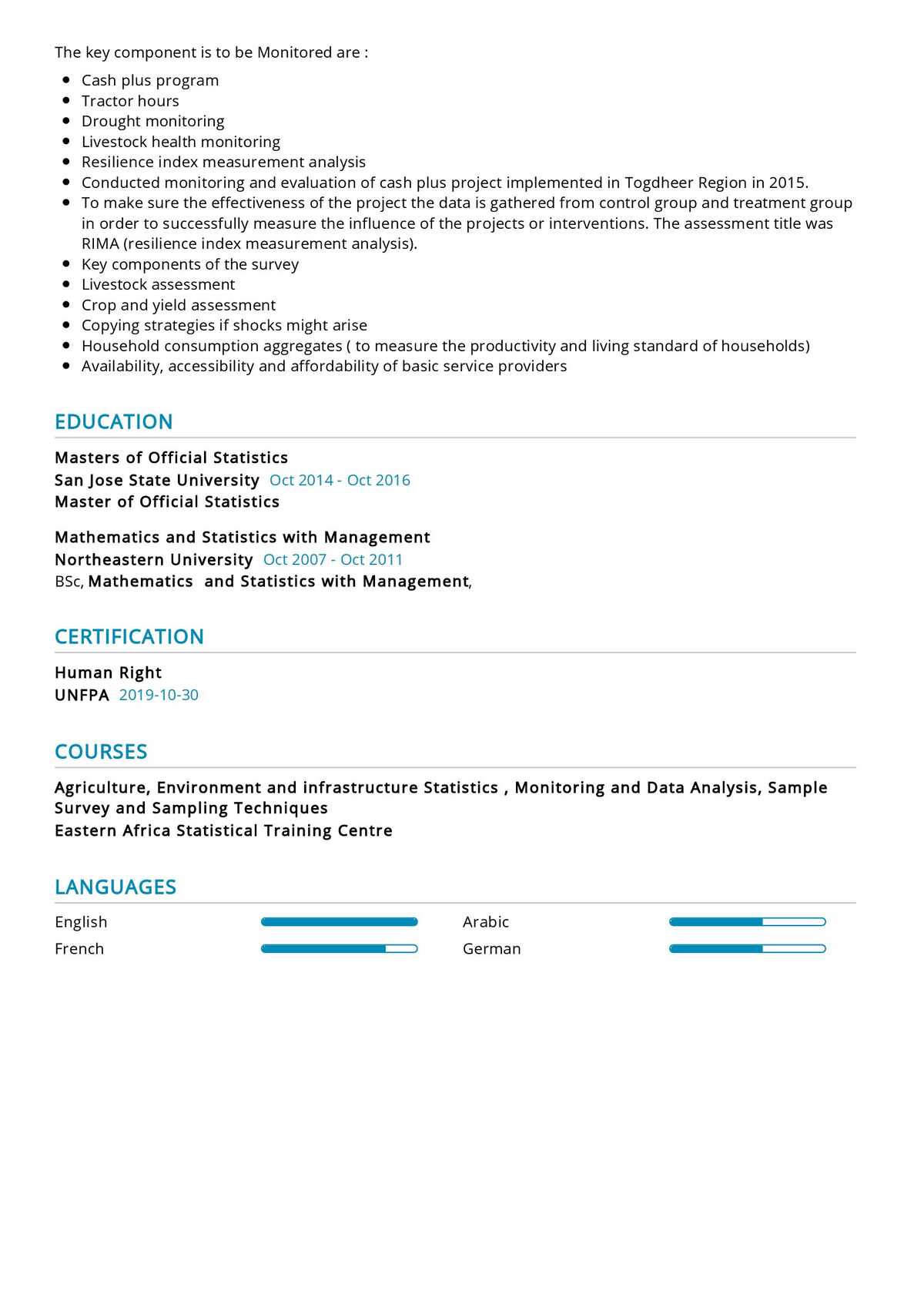Guide to Write a Perfect Survey Officer Resume
Whether you’re looking to step out of your comfort zone and apply for a new job position, or just want to refresh your skillset, writing a resume is one of the most important steps you can take. Why? Because it’s an essential tool that bridges the gap between your personal story and professional experience.
While compiling your resume, you’ll want to keep a few key things in mind. First of all, understand that your resume is essentially a marketing document for the skills and attributes that you bring to the table. You want to showcase your best qualities and differentiators while avoiding any information that might distract from your core message.
Survey Officer Job Description:
The Survey Officer (SO) is responsible for performing control surveys and logging data for one or more projects on a daily basis. In addition, the SO performs geodetic observations at remote sites and provides input to coordinate the efforts of the survey crew.
The SO must have a working knowledge of various surveying equipment, computers, and software including Global Positioning System (GPS), total stations, hand-held GPS units, digital cameras, digital audio recorders, and Microsoft Office suite applications.
Survey Officer Job Responsibilities:
- Performs control surveys and logging data for one or more projects on a daily basis
- Drives company-owned vehicle to project sites or meets project team members at assigned location to assist with data collection and other duties
- Operates surveying equipment and collects field data using hand-held GPS units, total stations, digital cameras, and audio recorders as required. Takes digital images of field conditions from vantage points of various heights (e.g., hilltops).
- Communicates information to project team members regarding geodetic observations and provides input to coordinate field activities when needed.
- Maintains a high level of safety awareness and conducts the daily operation of the vehicle in accordance with all policies, procedures, and regulations in effect.
- Supports the development of the company’s safety program as directed by management. Assists with requirements analysis and maintains a written program/training plan on company safety equipment, policies, procedures, and regulations (P&R) on a regular basis.
- Observes all regulations, procedures, and protocols in effect.
- Notifies others within the project team of any unsafe conditions at site or company vehicle.
The positions listed below are representative of the general nature and level of work performed by people assigned to this classification. All employees may be subject to a work schedule that is different from the times shown. If you have questions about your hours, please contact your supervisor or Human Resources representative for guidance.
Tips to Write a Survey Officer Resume Summary:
The survey officer resume will be the first component of your job search, so it’s critical to create an attention-grabbing resume that gets noticed and helps you stand out from your competition.
To ensure that you’re landing the best jobs, it’s important for you to start with a strong resume. Consider the role of the Survey Officer in this context: There are hundreds of thousands of job seekers out there vying for a spot, while only a small percentage get through each year.
The job description for a survey officer may seem pretty basic, but there are certain skills that set apart those who get selected for the job. Those skills include:
Has the ability to work effectively and efficiently in a team environment.
Is able to work well under pressure when deadlines are tight.
Is able to get along with other Survey Officers and is able to appreciate their efforts in a supportive manner.
Can lead other Survey Officers and has the ability to inspire confidence among team members.
The Best 10 Skills to put on Survey Officer Resume:
- Accurate and Reliable: This is one of the most important skills for a survey officer. You need to be able to create accurate data and put it in the right place.
Is able to work with technology and use equipment without difficulty. - Adaptable: A survey officer needs to be able to work in different conditions, so they must be adaptable as well as flexible enough to adjust their methods based on those different conditions.
Has an eye for detail. - Tech-savvy: In order to work with surveying equipment, you will need to know how to use various devices and programs.
Has good attention for detail. - Caring: As a survey officer, you will be working with others in the field. You should be able to put their needs ahead of your own (within reason, of course).
Has good organizational skills and attention to detail. - Collaborative: You must be able to work well with others and solve problems together.
Has great communication skills. - Confident: One of the main characteristics of a survey officer is their ability to remain calm and collected in even the most challenging situations, so they should be able to communicate this confidence to others as well.
Is good at communicating with colleagues on a team. - Creative: A survey officer job requires them to use their imagination in order to be effective at their job, so they should be able to come up with new solutions when problems arise.
Has a good track record of helping others succeed. - Determined: Although a survey officer job doesn’t require you to work long hours, it is important that you are able to stay focused and see your work through to the end.
Has good time management skills. - Flexible: Survey officers often encounter very specific situations and must be able to adjust accordingly in order to ensure that their projects run smoothly.
Is able to handle pressure well. - Fun: A survey officer job requires you to work in a team environment, so it’s important that you’re able has a good sense of humor, and are able to break the tension when needed.
Has good written communication skills.
Survey Officer Education Qualification:
If you want to become a survey officer, you should hold a degree in geography, architecture or surveying. Courses such as maths and computing may also prove very useful.
Equipment:
Survey officers will need access to specialized equipment and software that will help them capture data accurately.
A computer with access to the internet, a digital camera, a GPS and a mobile phone are all essential.
Tips to Write a Survey Officer Cover Letter:
A survey officer cover letter is a great way to showcase your personality and fit for the job. Here are some tips to keep in mind when writing your cover letter:
- Showcase your strengths: It is important that you highlight your relevant skills as a survey officer in each position, so you should emphasise how you’ve used those skills in a relevant position before.
- Keep it brief: You only have two pages to impress the employer, so make use of every single word and really make it count.
- Show off your personality: If you have a strong personality, and good writing skills, then show them off by focusing on your interests.
- Try to be memorable: As a survey officer cover letter is a one shot job, make sure that you use action words that will make the employer remember you, such as “I am looking forward to getting started on this exciting opportunity”, or “I would like to emphasise my commitment and dedication to the position.”
- Be passionate: Let the employer know that you are passionate about what you do. Your passion will show through and the employer will know that you are reliable and dedicated.
- Be concise: Don’t go on and on trying to demonstrate your skills. If you have proven your worth as a survey officer, then the employer is already convinced that you are qualified.
- Use the right words: Even though you are applying for a role as a surveyor, and not writing a novel, it’s always good to make use of strong verbs.
- Be specific: Employers like someone who can tell them exactly how they will benefit from hiring you. Give them clear examples and be specific about what you have achieved in the past.
Conclusion:
To become a survey officer, you need to have strong communication skills, excellent organizational skills, and the ability to think quickly on your feet. You must be able to handle pressure well and be patient enough to stay calm under pressure.



